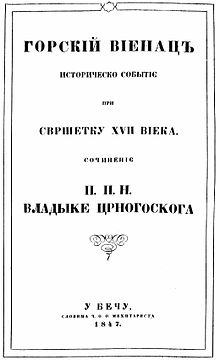The Mountain Wreath
 |
|
| Author | Petar II Petrović-Njegoš |
|---|---|
| Original title |
Горскıй вıенацъ (archaic) Горски вијенац (modern) (Gorski vijenac) |
| Translator | James W. Wiles, Vasa D. Mihailovich |
| Country |
Prince-Bishopric of Montenegro (today Montenegro) |
| Language | Serbian |
| Publisher |
Mekhitarist Monastery of Vienna (Vienna, Austrian Empire, today Austria) |
|
Publication date
|
1847 |
The Mountain Wreath (Serbian: Горски вијенац / Gorski vijenac) is a poem and a play, a masterpiece of Montenegrin literature, written by Prince-Bishop and poet Petar II Petrović-Njegoš.
Njegoš wrote The Mountain Wreath during 1846 in Cetinje and published it the following year after the printing in an Armenian monastery in Vienna. It is a modern epic written in verse as a play, thus combining three of the major modes of literary expression.
Set in 18th-century Montenegro, the poem deals with attempts of Njegoš's ancestor Metropolitan Danilo I Petrović-Njegoš to regulate relations among the region's warring tribes. Written as a series of fictitious scenes in the form of dialogues and monologues, the poem opens with Metropolitan Danilo's vision of the spread of Turkish power in Europe. Torn by inner conflict he sees that the struggle is inevitable, but dreads the issues.
Starting as a poetic vision it develops into a political-historical drama that expands into a wreath of epic depictions of Montenegrin life, including feasts, gatherings, customs, beliefs, and the struggle to survive the Ottoman oppression. With a strong philosophical basis in its 2819 verses The Mountain Wreath depicts three distinct, opposing civilizations: the heroic-patriarchal classic Montenegro, the oriental-Islamic Ottoman Empire and the west-European Venetian civilization.
The poem is constructed around a single, allegedly historical event, that took place on a particular Christmas Day in the early 1700s, during Metropolitan Danilo's rule: the mass execution of Montenegrins who had converted to Islam, known as "The Inquisition of the Turkicized" (Истрага Потурица or Istraga Poturica). Despite the difficulty of proving that an event of such magnitude and in such manner as described by Njegoš ever took place in Montenegro, the poem's main theme is a subject of significant political and ideological debate. Recently published History of Montenegro tells us that such an event initiated by Metropolitan Danilo occurred in 1707, but was highly localized in character, happening only in Ćeklići clan, one of over twenty tribes of Old Montenegro.
...
Wikipedia
